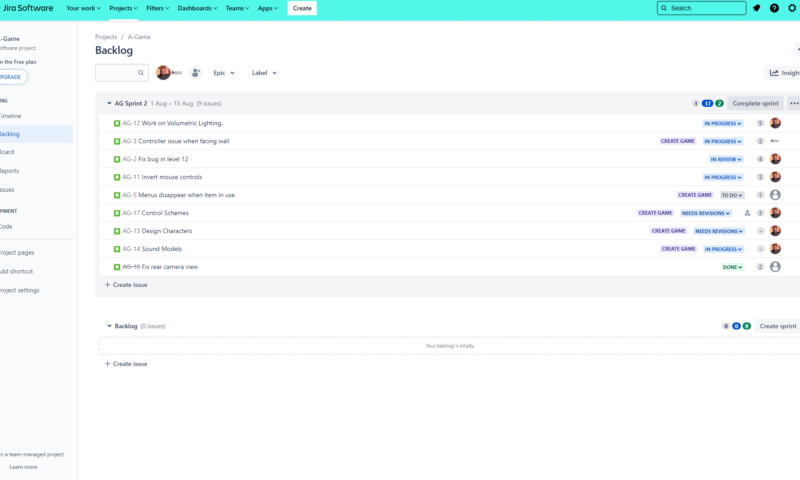Scrum masters, who use the best project management software to manage projects, and product owners, who manage product backlogs, tend to receive all the attention in scrum. However, the developers are the ones doing the heavy lifting. If you’re ready to learn about the importance of scrum developers, this “what is a scrum developer” guide is for you.
In this article, you’ll learn what a scrum developer is, their role within the agile framework, and the characteristics and skills they need to succeed. We’ll also clue you in on how developers interact with product owners and scrum masters, and show you some of the best scrum developer certifications you can get your hands on.
What Is a Scrum Developer?
A scrum developer (development team member) is a member of a product development group in the scrum framework. They have the technical knowledge to work on sprint backlog items (user stories) that ask for specific software or product features to be developed, tested and delivered to clients.
Scrum Developer: Key Responsibilities in the Scrum Framework
Like scrum masters and product owners, a scrum developer (software developer) must fulfill certain responsibilities in order for the scrum project they’re working on to be successful. Below, we’ll look at a scrum developer’s key responsibilities.
- Definition of ready: Scrum developers help the product owner create the definition of ready (work evaluation) for user stories before they enter the product backlog. This includes generating detailed stories or requirements and adding story points to tasks.
- Definition of done: Development team members work with the product owner to create the definition of done (criteria that user stories must meet before they can be considered complete) for items in the backlog.
- Team collaboration: Collaboration is a huge part of the scrum framework, and each member must be willing to be a vocal part of cross-functional teams.
- Creating new iterations of software: A scrum developer’s primary responsibility is to work on user stories that make up new iterations of software. Each developer is responsible for creating a functional element to include in the next software iteration.
- Reporting bugs and issues: Developers must report bugs and issues so they can be fixed before the sprint is finished.
- Testing and demoing software: At the end of each sprint, the scrum development team presents the current iteration of the software to clients and stakeholders, as they are the ones who build the software.
- Taking part in scrum ceremonies: All members of the scrum development team need to play an active role in scrum ceremonies, including daily scrum meetings, sprint planning sessions to determine the sprint goal, backlog and sprint review sessions, and sprint retrospective meetings.
Essential Skills for a Scrum Developer
It takes many skills to be an efficient, highly productive scrum developer. Scrum teams rely not only on a developer’s deep knowledge of software production but also on their soft skills. Below are lists of specific skills (both hard and soft) that scrum developers should have.
Technical Expertise (Hard Skills):
- Software development skills: Software developers must have sound software programming knowledge. Developers will be asked to work on UI design, software analysis, coding, testing and more to ensure that planned tasks can be completed.
- Team skills: Developers must be able to collaborate, communicate effectively, be accountable and do their job by fulfilling the responsibilities bestowed on them. It can also be beneficial to have developers who can coach and mentor others and who know how to use the best scrum software.
- An understanding of scrum: Scrum is a fast-paced, complex agile framework. Any developer who joins a scrum team must have a sound understanding of scrum. Knowledge of scrum can be developed with experience or by obtaining one of the best scrum certifications.
Soft Skills for Effective Teamwork:
- Goal-oriented: A team member who works on continuous improvement will succeed in this role, as goal-oriented individuals tend to focus on completing tasks that lead to a desired outcome.
- Responsible: The scrum team must complete a large amount of work quickly, so having a scrum developer who is responsible and does what’s asked of them is crucial.
- Time management: In order to finish the work on time, reach the required velocity and avoid scope creep, developers must have impeccable time management skills.
- Problem-solving: Figuring out how to pivot quickly is vital, as agile projects can change on a whim. Problem-solving also comes into play when developing software, as there will always be bugs and issues to be solved quickly.
- Interpersonal skills: Being able to listen, communicate, motivate, negotiate and show empathy are all traits that individuals working on close-knit teams must demonstrate. A positive attitude can also help.
- Self-organized: Self-organization is a vital trait for developers and scrum teams. Working autonomously without direction from others and being self-motivated to get work done will help the team tremendously.
The Scrum Developer’s Role Within the Scrum Team
Now that we know what a scrum developer is and the skills they should possess, it is time to examine the developer’s role on a scrum team.
Sprint Planning and Execution
As mentioned, developers play a critical role during sprint planning and execution. Developers are heavily involved in the following:
- Project requirements: Developers, scrum masters and product owners meet at the start of a project to discuss it. The kick-off meeting is an ideal time to discuss goals, objectives and requirements and set expectations.
- User stories: Developers work closely with the product owner to develop user stories for every backlog task. Developers help set the definition of ready and the definition of done, and collaborate to set story points to determine how much time each task will take.
- Backlog management: Developers help the product owner organize tasks by priority and help determine which user stories to include in the next sprint.
- Product development: Once a sprint starts, the developers are the ones who work on the product. It’s the developer’s responsibility to ensure the work they’re assigned is completed within the allotted time. Developers are also responsible for testing and demoing the product during the sprint review.

Daily Scrum Participation
All software developers on a scrum team must participate in daily scrum meetings (daily stand-ups) so they can quickly recap the work they are doing and how it’s going and discuss any issues.
Working With the Product Owner and Scrum Master
Scrum teams are small, so all members must work closely together. For a team to be successful, the team’s developers must interact with the scrum master and the product owner to ensure the goals and project requirements are met. Below, we’ll discuss how developers can help support other team members.
Aligning with the Product Vision
The product owner is responsible for the deliverables and product backlog and ensuring that there is a clear understanding of the project. However, scrum developers play a critical role in helping the product owner organize work, define user stories, complete the work and ensure the product aligns with the client’s or stakeholders’ original product vision.
Supporting the Scrum Master
The scrum master helps bring their team together with meetings and leads the team through projects via agile management. The scrum master role isn’t easy, but scrum developers can help ease the burden by participating in daily stand-up meetings, communicating transparently, finishing their work on time and participating in the sprint retrospective.
How to Become a Certified Scrum Developer
There are many ways to become a certified scrum developer. In this section, we’ll share some of the best certifications developers can obtain if they want to become a scrum team member.
- Certified Scrum Developer (CSD): The CSD certification shows that you have the technical skills to work in agile product development settings and can create products in an iterative fashion.
- Professional Scrum Developer (PSD): The Professional Scrum Developer certification will help you show employers that you can produce quality products using the scrum framework and with scrum teams using agile DevOp practices.
- Scrum Developer Certification (SDC): The entry-level SDC certification is for those who want to prove that they have the knowledge necessary to work with scrum teams.

Final Thoughts
Developers play a vital role in scrum. Not only do they communicate with product owners and scrum masters, but they also do the majority of the work on the product. If you’re a developer who’s ready to work in a flexible environment, the role of a scrum developer might be for you. We hope our scrum developer guide has helped you decide whether the role is right for you.
After reading our guide, do you want to become a scrum developer? Do you like the sound of the responsibilities developers have? Which of the scrum developer certifications pique your interest? Let us know in the comments. Thanks for reading.
FAQ: Scrum Developer
-
A scrum developer is responsible for understanding the business requirements that the product owner shares so they can create software or product increments that meet stakeholder and client expectations.
-
A scrum master leads and motivates other team members via agile practices and scrum ceremonies and takes care of risk management, budgets and more. A scrum developer is a team member who works on the requested product and helps the team reach the goals defined for tasks in upcoming sprints.
-
Scrum doesn’t involve coding, as it’s just a framework built on agile principles. However, a scrum developer will need coding skills, as it’s their job to develop software.
-
One of the best ways to become a scrum developer is to obtain a scrum developer certification. The Certified Scrum Developer certification from the Scrum Alliance is one of the best.
{“@context”:”https:\/\/schema.org”,”@type”:”FAQPage”,”mainEntity”:[{“@type”:”Question”,”name”:”What Is the Role of a Developer in Scrum?”,”acceptedAnswer”:{“@type”:”Answer”,”text”:”
A scrum developer is responsible for understanding the business requirements that the product owner shares so they can create software or product increments that meet stakeholder and client expectations.\n
\n”}},{“@type”:”Question”,”name”:”What Is the Difference Between a Scrum Master and a Scrum Developer?\t”,”acceptedAnswer”:{“@type”:”Answer”,”text”:”
A scrum master leads and motivates other team members via agile practices and scrum ceremonies and takes care of risk management, budgets and more. A scrum developer is a team member who works on the requested product and helps the team reach the goals defined for tasks in upcoming sprints.\n
\n”}},{“@type”:”Question”,”name”:”Does Scrum Involve Coding?”,”acceptedAnswer”:{“@type”:”Answer”,”text”:”
Scrum doesn’t involve coding, as it\u2019s just a framework built on agile principles. However, a scrum developer will need coding skills, as it\u2019s their job to develop software.\n
\n”}},{“@type”:”Question”,”name”:”How Do I Become a Scrum Developer?”,”acceptedAnswer”:{“@type”:”Answer”,”text”:”
One of the best ways to become a scrum developer is to obtain a scrum developer certification. The Certified Scrum Developer certification from the Scrum Alliance is one of the best.\n
\n”}}]}
The post What Is a Scrum Developer in Agile Teams? Get Certified in 2024 appeared first on Cloudwards.

